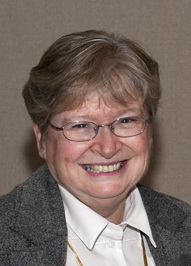|






| |
B y Lauri Roche y Lauri Roche
Do you remember when, for you, that first burst of interest in astronomy took
hold? Maybe it was when you were little and your parents took you camping on
crystal clear summer nights. Maybe it was later on when you finally had time to
do some of that science reading you always wanted to get to or when you looked
through a telescope for the first time. For every one of us in the RASC it was
something different but once you had it, it didn't let go.
For me, it was the astronomical event that took place in 1986, the return of
Halley's Comet, which was the trigger. My son was still tiny and I remember
walking with him in my arms looking out at the sky in the middle of the night
and thinking... �How in the heck did Edmund Halley know that this comet was
going to come back every 76 years? How DID scientists figure out that other
comets wouldn't be seen for at least another 10 000 years?� And that was that.
From that time on I started reading about early astronomers, watched Nova
programs on TV, and dove headlong into beginning texts on astronomy. But I know
that I was not particularly interested in actually going out and finding people
with telescopes and braving cold Ottawa nights. In fact, I don't think, at this
point, I even knew that the RASC existed. Just to read, to be an �armchair
astronomer�, was quite enough for me.
Jump forward about 7 years and my family had moved to Victoria. Once I was
comfortable in a new teaching job, a new house and family responsibilities I
realized that the Astronomy interest was still there and I went in search of
what I could do. Within a very short time I met two incredible people that paved
the way to today.
The first was Jack Newton, the well-respected astrophotographer and still a
member of our Victoria group. I went to the Eaton's Shopping Centre and asked at
the Black's Photography store if any one knew of a group of amateur astronomers
in the city or who I could contact. The person there directed me to Jack Newton,
who was, at that time, the manager of the Mark's and Spencer's store in the
shopping centre. I remember going right up to him in the store and asking about
an astronomy group. It did seem a bit strange but, nevertheless, he was very
gracious and directed me immediately to the RASC meeting the next week at UVIC.
He gave me the date, the room number and welcomed me along. And so I went to my
first meeting...very shy, quite intimidated by all those smart people, but
fascinated by the woman speaker from UVIC. I was officially hooked.
The second person is also well known to you: Sandy Barta. After going to a few
of the meetings in the spring I went up to the Hill on a summery, warm Saturday
evening. Not knowing really what to do, I followed other people and got into a
line-up at one of the telescopes. When it was my turn there was this woman,
funny, cheery, and very comfortable and patient, telling me how to see through
the eye- piece. I saw the Ring Nebula for the first time. I asked her about her
telescope. I asked her how she knew where to find the Nebula. I asked her when
they were going to be there again. By that time she had to shoo me away from the
telescope so others could look, but I didn't need too much more than that as a
newcomer...the introduction to knowledgeable and accommodating people, a great
program of astronomy presentations and free views through some telescopes.
Jump a few more years and now, here I am, taking on the responsibility of the
presidency of this terrific organization. I am looking forward to working with
people on council and have some goals in mind to work toward. I want to ensure
our continuation of our excellent work with public outreach and the school
programs, and to widen the observing and astrophotography net to include live
and taped video programming. I want our Light Pollution Abatement initiatives to
culminate in an Urban Star Park or a Dark Sky Preserve within the next two
years. But mostly I would like to have people in our community of Greater
Victoria and beyond have the opportunity to also have that � trigger� moment
when they decide that they want to learn more about astronomy. That may happen
at a school evening star party, a public event such as the lunar eclipse coming
up in December, or a community festival. No one knows when the moment will
strike but, when it does, I hope that, as members of the RASC, we will all be
there, as cheerful, as knowledgeable, and as welcoming as they were for me when
I first came to Victoria.
Our members are the roots of what we are as a group, both locally and
nationally. We need to keep the membership strong, keep it lively, and keep it
growing. I would like to make the growth and maintenance of our membership a
real priority over the next two years, as well. I would like to say thank you to
a few members of council who are stepping down this year: Dave Bennett, Sandy
Barta, Colin Scarfe, Scott Mair and Steve Pacholuk. Their hard work, interests
and contributions over the last few years have been very much appreciated by
everyone.
Let's hope for clear skies this coming Christmas season and that we will be able
to get out under the stars wherever you may be. Stay warm. Keep observing. Keep
your own interest in astronomy going and then .....pass it on!
|